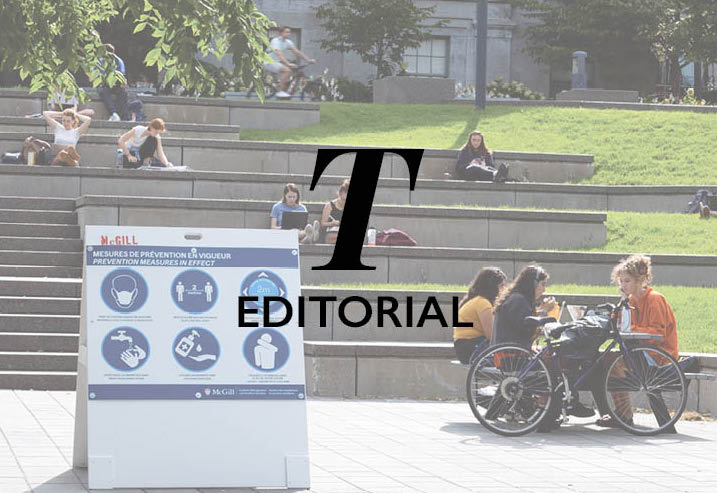Following the Quebec government’s Feb. 4 announcement that universities and CEGEPs would be permitted to gradually reimplement some in-person activities, McGill notified students that Tier 2 academic activities such as some conferences, tutorials, and lectures would resume on campus. Although government officials and members of McGill’s administration have cited students’ mental health as a driving reason behind the decision, administrators appear to be underestimating the reality of the pandemic in the province and the logistical nightmare that reopening campus mid-semester could entail. By encouraging students to return, McGill may be facilitating risky, virus-spreading behaviour and endangering the lives of academic staff who may perceive pressure to facilitate in-person instruction. Students must beware of McGill’s haphazard reopening plan, but the onus is on the institution to demonstrate that it can safely open its doors.
McGill’s embrace of in-person instruction is inconsistent with all of its rhetoric up to this point. Students living in first-year residences are required to comply with strict regulations, and some were temporarily evicted starting Jan. 25 for violating the rules. Yet now, for all of the administration’s harsh discipline of first-year students in residence, more are being invited to classrooms under the same assumption that they will be responsible enough to comply with public health rules. Those who return to campus may neglect safety provisions and relink with classmates, potentially spreading the virus. And although in-person functions will be optional, students may feel pressure to attend them—in spite of their best judgement of the risk—due to the prospect of seeing other people and the perceived advantages of physical instruction.
Montreal is still in a partial lockdown. Considering that the curfew from 8 p.m. to 5 a.m. will still be in place and that it will remain unlawful to gather with people from outside of one’s residence, it would be unwise for McGill to create an environment where students may be tempted to forego precautions.
It is also worth questioning whether some students in Montreal should be able to benefit from physical instruction while their peers who are not in the city cannot. This could create inequities in learning that would not exist under normal circumstances or even if optional in-person classes were available from the start of the semester.
Consider also that students were informed that spring convocation would be delivered remotely on the same day of the government’s announcement. Although a convocation with hundreds of people is a tremendous leap from any of the Tier 2 activities, the fact that it will be online is a reminder that the pandemic is still dangerous and will not disappear any time soon. The reopening is also contingent on the stability of the current public health situation. If cases suddenly spike, which is likely as restrictions are loosened, the decision may be reversed.
Equally concerning is the university’s apparent disregard for the well-being of its academic staff who may be compelled to teach in person. McGill must demonstrate that they are providing the resources necessary to safely accommodate in-person teaching—it has made a good start by providing mandatory masks for people coming to campus—and to help course instructors surmount the logistical challenges involved in that process.
Although administrators are correct to recognize that social isolation has jeopardized students’ mental health, McGill can extend its support for mental health services beyond simply hosting in-person activities—not least because they would only serve students currently in Montreal. Instead, McGill can safely and concretely commit to alleviating students’ mental health by expanding services like the Wellness Hub’s counselling services or promoting academic solutions as it did in reimplementing the Winter 2020 emergency Satisfactory/Unsatisfactory grading option.
Students who choose to attend in-person activities must be cognizant of the dangers and abide by public health ordinances. But McGill will bear full responsibility for the damage it causes if its reopening runs aground against yet another pandemic reckoning.









It is very concerning to me that Universities in Canada are not receiving much of the information and data that has come to light in the US regarding resumption of in-person learning (which in most cases–not all–began in the Fall of 2021) and the lack of evidence of transmission of COVID within the school setting when precautions are taken. To quote a recent Journal of American Medicine “As many schools have reopened for in-person instruction in some parts of the US as well as internationally, school-related cases of COVID-19 have been reported, but there has been little evidence that schools have contributed meaningfully to increased community transmission.”
McGill students are suffering from social and academic isolation and in some cases severe depression as a result of the closure of the University. Let’s not wring our hands and a feel there are no data to show us the safety of opening Universities amid living with COVID, when the CDC in the U.S. and the universities themselves have proven it can be done safely. The repercussions of remaining closed are too dangerous. McGill should be leading the fight to outline safety measures (masks, temperature checks, social distancing, sanitizing) for its buildings and those who live and work in them. COVID is here, it’s not going away, and we must learn to LIVE in its presence while doing everything we can to protect the small percentage of the population that is truly vulnerable to it.
https://www.cdc.gov/coronavirus/2019-ncov/more/science-and-research/transmission_k_12_schools.html